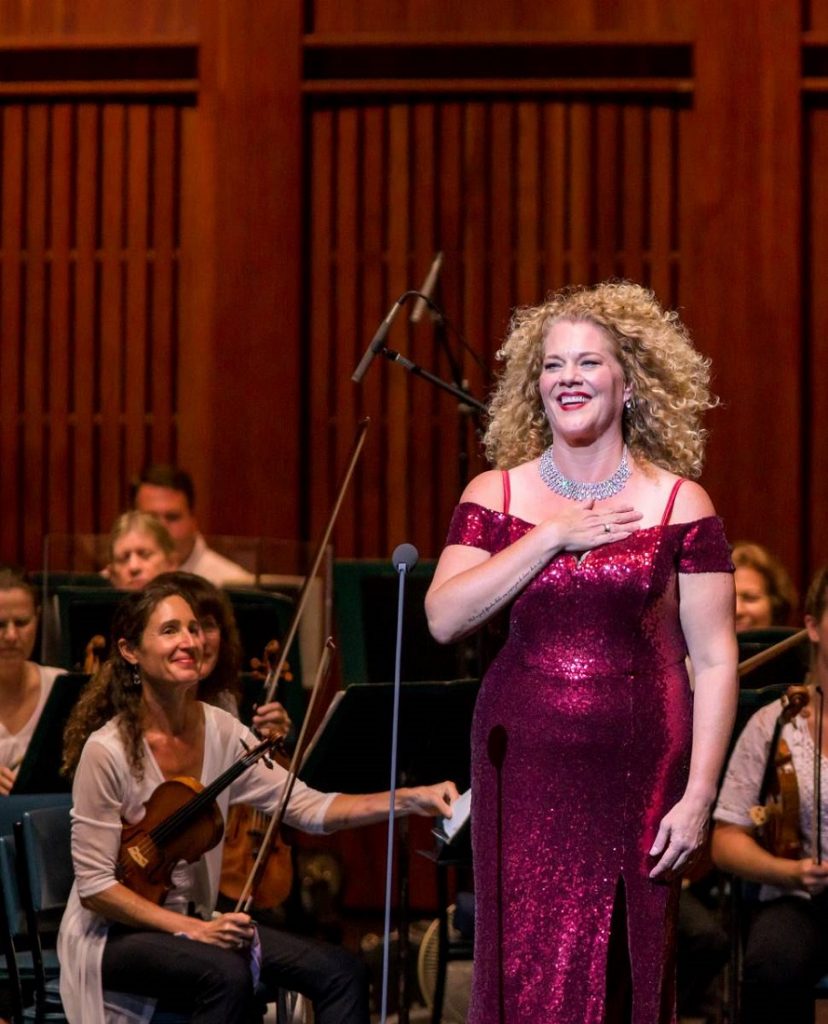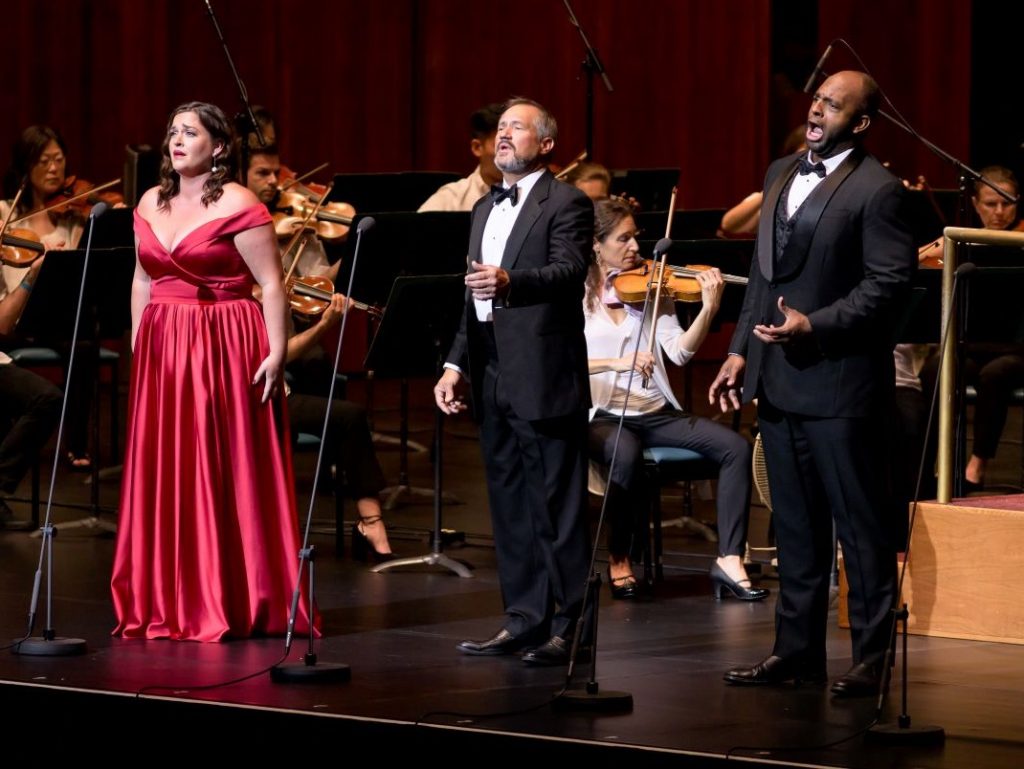Incandescent opera rarities with NSO and Wolf Trap Opera stars, past and present

Michelle DeYoung performed with the NSO at Wolf Trap Friday night (Photo: A.E. Landes, courtesy of Wolf Trap)
Few things are as agreeable on a summer night as a concert of opera scenes and arias. No need to think too much about the often absurd plots, as long as there are a broad range of selections and gifted singers to thrill the ears. Wolf Trap Opera Company delivered both on Friday night at the Filene Center, during one of the Washington area’s all-too-infrequent breaks from summer heat and humidity.
The National Symphony Orchestra, under conductor Christopher Allen, teamed up with Wolf Trap Opera stars of yesterday and today. At the top of the list was mezzo-soprano Michelle DeYoung, whose last return to Virginia was a delectably heartless Amneris in Wolf Trap’s 2015 Aida. This time DeYoung took the stage with Eboli’s “O don fatale” from Verdi’s Don Carlo, throwing out blazing high notes, as the character cursed her own beauty (“Ti maledico, o mia beltà!”), and yet plangent in the depths of her sorrow.
DeYoung returned after intermission for one of the program’s highlights, the duet “Nuit d’ivresse” from Berlioz’s rarely performed Les Troyens. Although she physically towered over her Énée, the celebrated tenor Paul Groves, this was a moment of tender compassion, with the two voices, expertly calibrated to one another, melding over the lush and hushed strings in pastoral beauty.
Groves, another veteran, adapted his still potent voice to a number of different combinations. His lyrical tone yearned toward youth in the scene “A moi les plaisirs” from Gounod’s Faust, appropriately overwhelmed by the greater power of bass Raymond Aceto as Méphistophélès. Groves was on more even footing with baritone Jonathan Bryan, from this year’s Wolf Trap class, in the lilting duet “Au fond du temple saint” from Bizet’s Pearl Fishers, complete with Wolf Trap’s idyllic wildlife accompaniment in the soft passages with harp.
Wolf Trap alumni of more recent vintage also had memorable turns. Soprano Tamara Wilson, who made waves in Wolf Trap’s Un Giorno di Regno in 2008, was a startling Abigaille in the Act I trio ““Fenena! O mia diletta…Io t’amava” from Verdi’s Nabucco. With both power and sweetness, Wilson floated the high notes as she interjected her lines, an extraordinary vocal presence that was suddenly revealed on its own when the texture around it disappeared.
In this scene, tenor Robert Watson had his most clarion moments as Ismaele, with ringing high notes and the throbbing vocal tone so fitting for Verdi. Mezzo-soprano Gretchen Krupp, a current Wolf Trap Opera young artist already distinguished in a smaller role earlier this summer in Joseph Bologne’s L’Amant Anonyme, matched her colleagues with searing power of her own as Fenena.
Wilson’s solo turn came in “Vissi d’arte” from Puccini’s Tosca. The Arizona-born soprano deployed the needed wattage at the top for an exciting finish. More importantly her dramatic poise and reserve made this celebrated aria the moment of quiet anguish it is supposed to be.
Bass-baritone Ryan Speedo Green was a Wolf Trap Opera young artist in a striking Milhaud-Poulenc double-bill in 2014. His voice has developed admirably, with a rich and resonant top that shook the rafters in “O tu, Palermo” from Verdi’s I Vespri Siciliani. In addition to the revolutionary fervor of Procida, having just landed in Sicily, Green’s silky legato tone produced an urbane sheen of homesick nostalgia, matched by the NSO’s slithering woodwind lines.

Ann Toomey, Paul Groves, and Ryan Speedo Green in a trio from I Lombardi at Wolf Trap (Photo: A.E. Landes, courtesy of Wolf Trap)
A few other scenes featured members of the current class of Wolf Trap Opera young artists. Michigan-born soprano Ann Toomey matched dulcet innocence and a dark undercurrent of photon-beam power as Mimi in the break-up quartet from Act III of Puccini’s La Bohème. Toomey had greater latitude for dramatic force in the trio “Qual voluttà trascorrere” from Verdi’s I Lombardi, where her voice knifed through the full textures with effortless beauty.
Groves had another fine moment in this bittersweet scene from the end of Act III. He interlaced his honeyed tone with the poignant violin solos of NSO concertmaster Nurit Bar-Josef, like the angel that waits to guide the dying Oronte to paradise after his deathbed conversion.
Soprano Alexandra Nowakowski continued to impress in this rarefied company, first as a hilariously spiteful Musetta in the quartet from La Bohème, trading barbs with the boisterous Marcello of Jonathan Bryan. She showed more refinement as Violetta in the Act I brindisi from Verdi’s La Traviata, answering the toast of Robert Watson’s Alfredo. The entire ensemble of the evening’s ten singers made a crackerjack chorus for a final effervescent pop of the champagne cork.
Christopher Allen conducted with broad gestures but was not always able to put singers and orchestra completely at ease, as slight adjustments for rubato sometimes did not line up ideally. The NSO distinguished itself throughout, heard on its own only in the concert opener, a precisely marshalled Overture from Verdi’s Nabucco. While the woodwinds had some trouble agreeing on intonation at the start of the “Va, pensiero” melody, the brass section excelled in their heraldic moments.
The NSO returns to Wolf Trap with soprano Renée Fleming and conductor Patrick Summers 8 p.m. August 6, for a final tribute to the 50th anniversary of classical music at Wolf Trap. wolftrap.org
